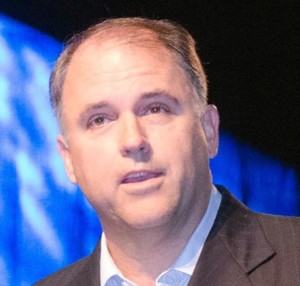Seven years after he was fired as the leader of a Baptist state convention, Will McRaney may finally get his day in court against the Southern Baptist Convention’s North American Mission Board.
After years of legal wrangling, a new trial date has been set for April 2023, McRaney said in an interview with Baptist News Global last week. It is likely that NAMB will once again try to stop the case from proceeding by renewing its request for a summary judgment in its favor, meaning the judge would find the facts of the case so lacking in evidence as not to merit a trial.
On Jan. 12 this year, a U.S. District Court denied NAMB’s request for summary judgment, saying the work of discovery — a legal term for gathering evidence — must be completed first before such a decision could be considered. Discovery was scheduled to be concluded by October 2022 but now has been extended to the end of the year, McRaney said.

Will McRaney
Despite that delay, depositions “will be starting soon,” McRaney said. That means multiple Southern Baptist officials will be required to give depositions under oath.
If NAMB officials want to keep from answering those questions in court, McRaney said he’s still open to a settlement. “If the NAMB trustees want to do what is right and keep the courts from deciding the case publicly, then they can do what many would agree should happen, including making restitution to me.”
McRaney alleges that NAMB leadership, and in particular President Kevin Ezell, conspired with leaders of the Baptist Convention of Maryland and Delaware to fire him as executive director of that two-state convention when he refused to go along with NAMB’s demands about how church planting was to be conducted in his region.
McRaney alleges that NAMB threatened to withhold $1 million in annual funding if McRaney were not fired by the regional convention’s board, even though that convention is fully independent of NAMB and the SBC.
Further, according to court documents: McRaney alleges that “NAMB leadership continued to interfere with business and contractual relationships that McRaney had with third parties.” That included McRaney being disinvited to speak at events sponsored by two other state Baptist conventions, one in Florida and one in Mississippi.
In sum, he said in the recent interview, he went four years without work, “I have been damaged in countless ways, including but not limited to financially, ministerially, relationally, professionally,” and “my wife, children and I have suffered through the actions of NAMB.”
There are common reasons a defendant might want to avoid going through deposition and trial.
While NAMB has not indicated what its next legal step will be, there are common reasons a defendant might want to avoid going through deposition and trial. Those include a desire to avoid making public documents and facts that would present the defendant in an unflattering light to its constituency.
The case has drawn national attention because a legal debate about “ecclesiastical abstention,” a doctrine that keeps most secular courts from interfering in the ecclesial work of churches. At first, the U.S. District Court in the Northern District of Mississippi dismissed McRaney’s lawsuit on those grounds. McRaney argued on appeal that the ecclesiastical abstention doctrine did not apply. That led a three-judge panel of the U.S. Court of Appeals for the Fifth Circuit in July 2019 to reverse the earlier dismissal, saying this case appeared to be about more than “purely ecclesiastical questions.”
In a similar debate about ecclesial boundaries earlier this month, another federal appeals court said the Russian Orthodox Church Outside Russia may not be shielded from a lawsuit brought by a priest who was denied appointment as a bishop due to what he claims were defamatory accusations against him.
The case of Alexander Belya bears striking similarities to McRaney’s case.
Earlier, more than three dozen outside parties filed amicus briefs asking the U.S. Supreme Court to end McRaney’s case, claiming if the case were to proceed it would be a violation of religious liberty rights afforded churches. One such outside party was the SBC’s Ethics and Religious Liberty Commission, then led by current Christianity Today Editor in Chief Russell Moore. The Supreme Court rejected that argument and let the case proceed.
McRaney’s case potentially dovetails with the current U.S. Department of Justice investigation of sexual abuse within the SBC.
Here, then, is where McRaney’s case potentially dovetails with the current U.S. Department of Justice investigation of sexual abuse within the SBC. One of the SBC’s key defenses against responsibility for mishandling sexual abuse cases is that the denomination is not a hierarchy, that denominational leaders have no control over the various agencies and the thousands of local churches because all are autonomous.
Yet at one point, Moore and the ERLC filed an amicus brief stating that the SBC is a “hierarchy” and “umbrella organization” wherein state conventions are accountable to its national entities. The ERLC later amended that brief, after its publication created a firestorm of protest within the denomination.
Now, after an independent investigation by Guidepost Solutions found multiple evidences of SBC leaders knowing about sexual abuse and not acting to report it or prevent it, McRaney sees a clear line of continuity between his firing and those scandals.
“I view NAMB’s misconduct directed toward me as symptomatic of a broader pattern and practice that has allowed multiple forms of abuse to occur and persist such as abuse of power, financial resources and position,” McRaney told BNG. “I have been blackballed and blacklisted for raising questions, challenging misbehavior, and speaking up. So too with many who have tried for years to raise red flags about other potential abuses.”
From his vantage, the root problem is agency trustees not doing the work needed to police and guide the institutions they are sworn to serve.
“Ideally, the SBC trustees would self-police and correct their entities and leaders as a part of their fiduciary duties. However, by numerous statements of SBC and state Baptist leaders, the SBC trustee system is broken and in most cases is not capable of doing their duties.”
Although the DOJ has declined to indicate the scope or even the nature of its investigation of the SBC, McRaney believes the feds are looking for more than just unprosecuted sex crimes. He believes — or hopes — they also are looking for fraud, criminal collusion and more.
While he has a problem with some leaders and trustees in SBC agencies, McRaney said he owes his vocational heritage to a denomination he still supports.
While he has a problem with some leaders and trustees in SBC agencies, McRaney said he owes his vocational heritage to a denomination he still supports.
“At age 10, I was led to Christ and joined a Baptist church that was cooperating with the SBC as a part of their missions,” he explained. “I have served in a variety of roles that have been in some way cooperative with the SBC — youth pastor, pastor, church planter, seminary graduate with an M.Div. and Ph.D. from an SBC seminary, seminary professor in evangelism and church planting for 11 years at New Orleans Baptist Theological Seminary, six years with the Florida Baptist Convention, two years as executive director of the Baptist Convention of Maryland and Delaware, and I have done contract work for Lifeway and NAMB and helped numerous Baptist associations and churches.”
And even now, “I currently serve as the senior pastor of a church that is in cooperative relationship with the SBC,” he noted. While the SBC has no individual members — only churches may affiliate with the denomination — “I identify as a follower of Christ and support the cooperative mission of Southern Baptists and other mission efforts.”
Nevertheless, he believes the SBC (through NAMB) owes him restitution of lost income, legal fees and of his good name. So far, six years after his termination, none of that has been forthcoming.
McRaney now serves as senior pastor of The Island Chapel near St. Petersburg, Fla., and as president of the Bullock Institute, a start-up seminary. He and his wife, Sandy, have funded “probably 80% of our legal expenses, and some family and supporters have made gifts as well,” he said. He’s also established a GoFundMe account to generate financial support.
Related articles:
McRaney case against NAMB must proceed for now, U.S. district court rules
Supreme Court rejects NAMB’s request, sending McRaney case back to trial
SBC agency’s appeal to Supreme Court touches on religious liberty, defamation and Baptist autonomy
Appeals court allows priest’s defamation case to proceed against Russian Orthodox Church


